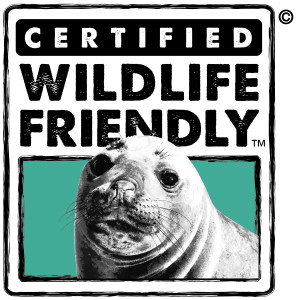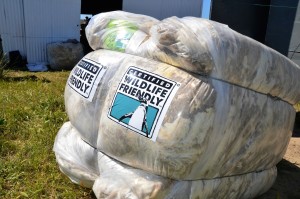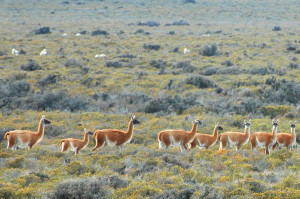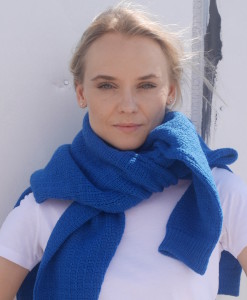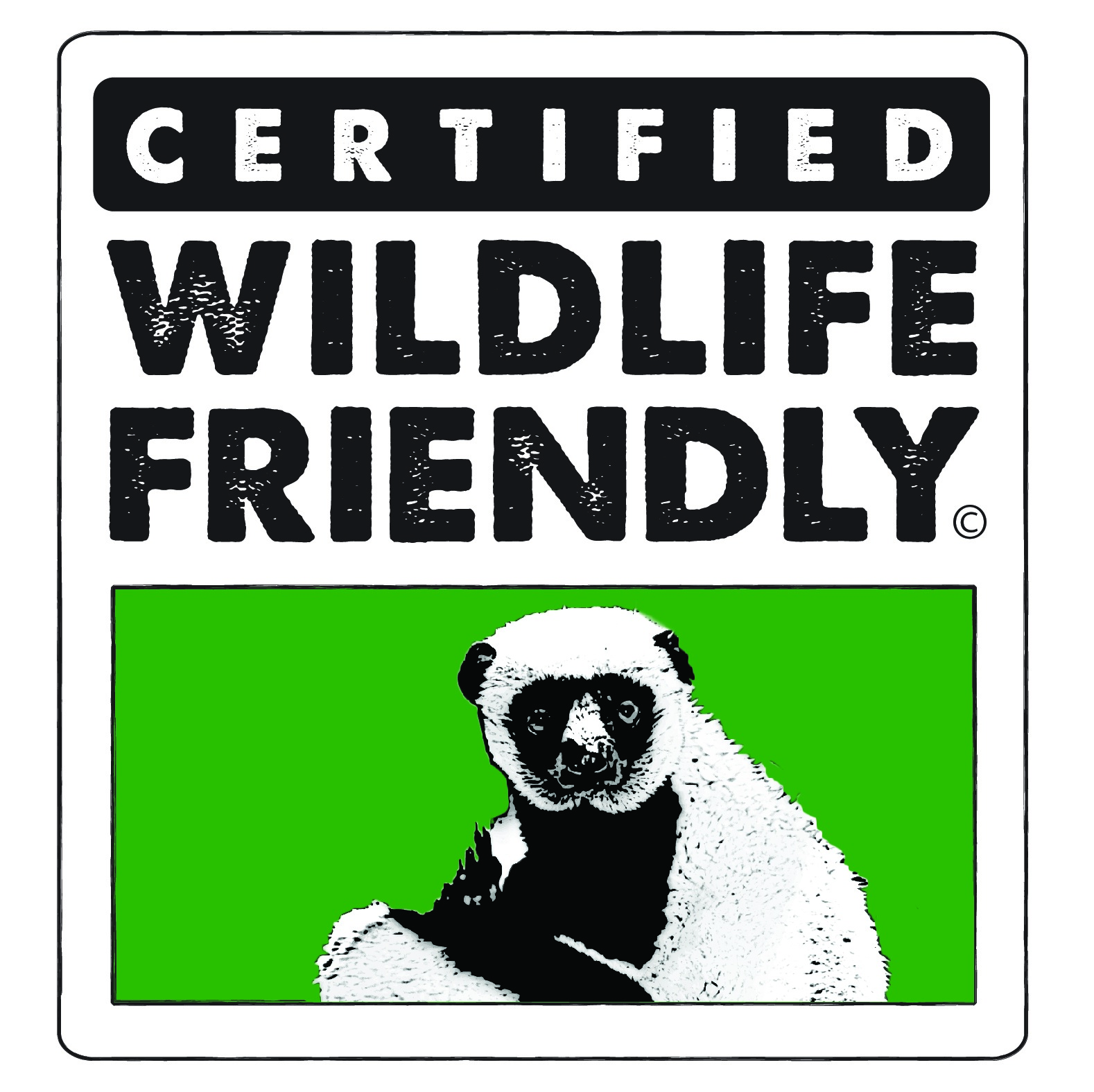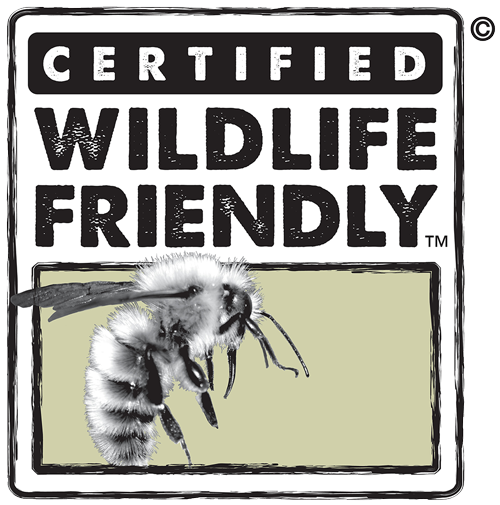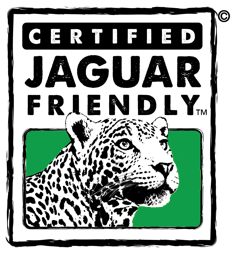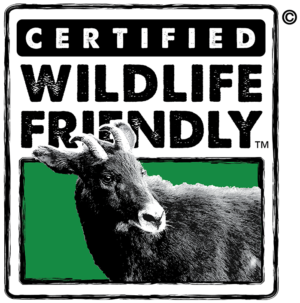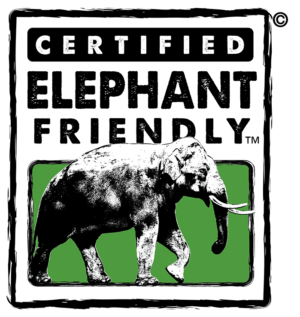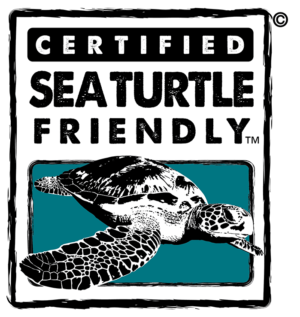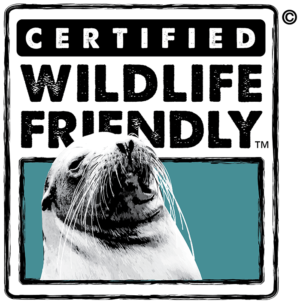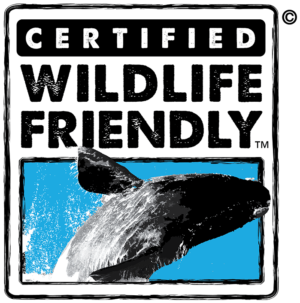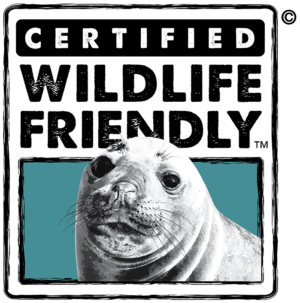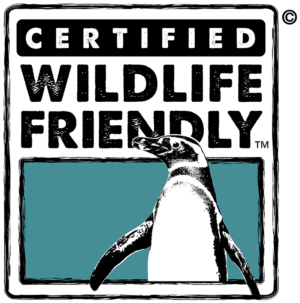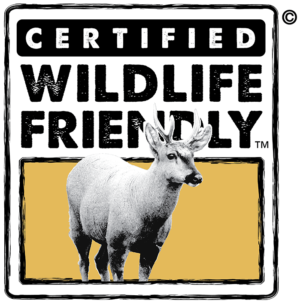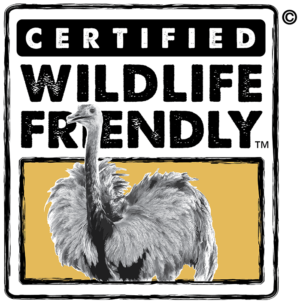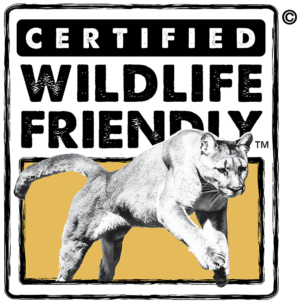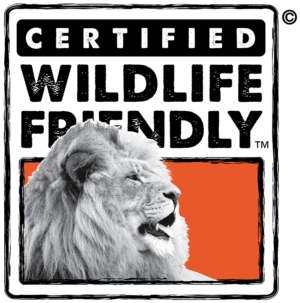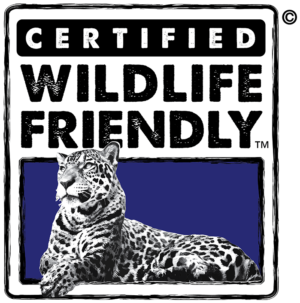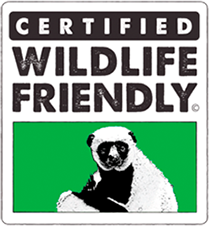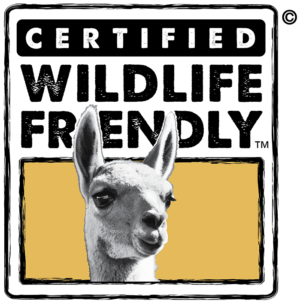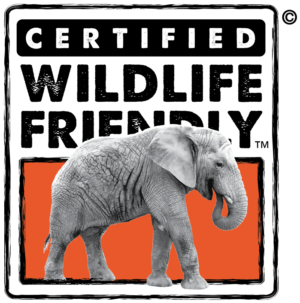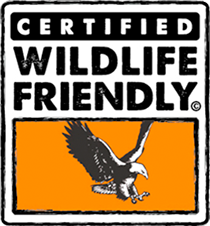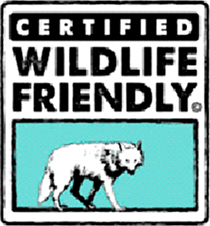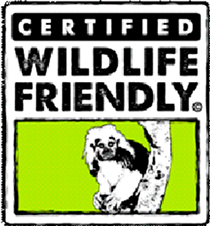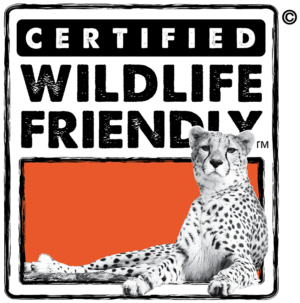Mohair Merino & Cashmere Certified Wildlife Friendly™ in Neuquen Argentina
Sustainable products promote coexistence between native wildlife
and fiber production
FOR IMMEDIATE RELEASE
The Wildlife Friendly Enterprise Network (WFEN) and the Wildlife Conservation Society Argentina (WCS) are pleased to announce the Wildlife Friendly™ certification of high quality mohair, merino wool, and cashmere, in recognition of the efforts of a cooperative of criancero herders to co-exist with the region’s native wildlife.

Local mixed-breed dog working as a guarding dog for goats. Credit: Alejandro Gonzalez.
Following years of work to improve land management practices and fiber quality, and support from WCS, 12 herders of the Neuquén, Argentina-based Programa Mohair are now offering both raw fiber and spun yarn for sale, under the Fibras del Viento (Fibers of the Wind) label. Fibers are available in natural colors and dyes, including green from Yerba mate, the national beverage of Argentina. Fine yarn and finished goods are spun and handcrafted at a small mill operated by cooperative members.
“The commitment of these herders participating in the Programa Mohair shows that it is possible to improve land use practices and combine increased product value with real conservation results. This is a high impact social and wildlife achievement that we hope will inspire other livestock producers in Patagonia,” said Guillermo Harris, WCS Argentina Director.

Puma in Laguna Blanca National Park, where some of the certified herders live. Credit: WCS Argentina
The actions of the livestock herders to coexist with native wildlife are important to the conservation of the unique fauna criollo dogs to protect their livestock from predators. Although their family farms are small, and they often struggle to maintain their livelihood, the herders are committed to sustainable production for the good of their land, livestock, and native wildlife.
“We are watching a Wildlife Friendly™ fiber movement unfold right now across Patagonia” said Julie Stein, Executive Director and Co-founder of WFEN. “Part of our mission is to create communities of practice that share innovations, challenges and successes across landscapes. These Programa Mohair herders and a growing number of ranching neighbors are at the leading edge of that effort. Designers, consumers and companies are taking note of their compelling stories of coexistence. Each step forward by these producers has been the result of hard work, and is thrilling to witness. We congratulate these heroes of conservation for their actions.”
Consumers wishing to purchase these responsibly produced fibers can write to ventas.fibrasdelviento@gmail.com or coopeagropezapala@gmail.com

Products made from mohair and mohair-merino blends. Credit: Susan Walker
###
About Wildlife Friendly Enterprise Network
WFEN and its Certified Wildlife Friendly®, Predator Friendly®, Certified Gorilla Friendly™, Jaguar and Sea Turtle Friendly™ certification programs represent grassroots farmers, ranchers, artisans, indigenous peoples and conservation heroes from around the world including two World Bank Development Marketplace Award winners, a U.N. Equator Prize winner, leadership in the world’s marketplace for REDD+ Carbon Offsets, a Time Hero for the Planet, and a National Geographic Big Cats Initiative grantee. Certified Wildlife Friendly® products contribute to the conservation of over twelve million hectares of diverse wetlands, forests, and grasslands; protect keystone endangered species in Asia, Africa, Europe, and Latin and North America, including the Snow Leopard, Elephant, Tiger, Cheetah, Red Panda, and Wolf; and benefit over 200,000 people through increased food security, income and employment. For more information visit: www.wildlifefriendly.org
About WCS (Wildlife Conservation Society)
MISSION: WCS saves wildlife and wild places worldwide through science, conservation action, education, and inspiring people to value nature. To achieve our mission, WCS, based at the Bronx Zoo, harnesses the power of its Global Conservation Program in nearly 60 nations and in all the world’s oceans and its five wildlife parks in New York City, visited by 4 million people annually. WCS combines its expertise in the field, zoos, and aquarium to achieve its conservation mission. Visit: newsroom.wcs.org Follow: @WCSNewsroom. For more information: 347-840-1242.
Visit: www.wcsargentina.org;
https://www.facebook.com/TheWCS;
https://www.youtube.com/user/WCSMedia
Follow: @thewcs
Contact:
Wildlife Friendly
WCS Argentina’s Patagonian Fibers with a Conscience™ Program and Certified Wildlife Friendly™ Ranchers Make Wool Available Sustainable Fashion Buyers
FOR IMMEDIATE RELEASE
Puerto madryn, Argentina (November 4, 2016)—The Wildlife Friendly Enterprise Network (WFEN) and the Wildlife Conservation Society-Argentina (WCS) are pleased to announce traceable Certified Wildlife Friendly® wool—part of the “Patagonian Fibers with a Conscience” program—from the “Merino de Peninsula Valdés™” ranchers who raise wool in coexistence with wildlife on Peninsula Valdés. The traceable certified wool is now available for purchase through a new online portal.
WCS Argentina supports the ranchers of the Merino Peninsula Valdés™ group who are committed to managing their ranches to allow healthy populations of guanacos, rheas, and maras to co-exist with their sheep, and to use non-lethal methods to control predation by pumas, chilla foxes, and Geoffroy’s and pampas cats. Fundación Vida Silvestre Argentina (FVSA) will provide third-party verification of compliance with commitments and collaborate with WCS to monitor impacts on wildlife. “We all agree in making the coexistence between sheep ranching and healthy wildlife a long-term achievement,” said Alejandro Arias, coordinator of the FVSA program in Península Valdés.
Península Valdés is a 4,000–square-kilometer (1,544 square miles) protected area in Patagonia, declared a UNESCO Natural World Heritage Site in 1999. Compared to other sites in the region, the steppe of Península Valdés still harbors significant populations of native wildlife, and its waters are critical habitat for southern right whales, sea lions, and elephant seals during reproduction. Although a management plan has been effective in conserving coastal wildlife, the land is privately owned and sheep ranching is widespread within the area.
“These ranchers are committed to implement wildlife-friendly practices because they are convinced that their economic futures are better served by moving away from maximizing sheep stocking rates on their ranches and adding value by conserving native species at Península Valdés, an emblematic site of Patagonia. To achieve our goals, we are implementing management actions based on scientific research on wildlife ecology,” said Ricardo Baldi, a scientist from CONICET, the Argentine national science agency, and consultant for WCS.
“’Patagonian Fibers with a Conscience™’ serves as an inspiring example of how to combine sustainability with effective conservation,” said Dr. Guillermo Harris, Director of WCS’s Argentina Program. “We’re showing that we can protect guanacos and other wildlife and support the local economy. It’s a win-win for Peninsula Valdés.” WCS work with these ranchers is supported by the USFWS Wildlife without Borders program.
“We’ve had keen interest in this wool from the sustainable fashion industry,” said Julie Stein, Executive Director of WFEN, a global community dedicated to enterprises that contribute to the conservation of threatened wildlife and to the economic vitality of rural landscapes. “It’s very exciting. For example, luxury-brand Bolek, has utilized this wool for their upcoming knitwear capsule collection.“
“Projects like Wildlife Friendly® and Merino de Peninsula Valdés™ give new designers like me the unique opportunity to do what is right from the beginning,” said Sarah Chojecki, founder of Bolek. Ms. Chojecki, a graduate of the Fashion Institute of Technology, is headquartered in New York City and curated a partnership with Wildlife Friendly® on the basis that consumers should have ecological awareness and sustainability in the forefront of their minds when purchasing.
“This is one of the only landscapes in the world where wool is produced adjacent to a thriving marine ecosystem. It’s special,” Ms. Chojecki mused. “To have ranchers that go the extra mile to allow wildlife to have a safe refuge on private lands. It’s important. More individuals should be like this.”
“We applaud forward thinking designers like Ms. Chojecki for building wildlife and sustainability into the DNA of their companies,” said Ms. Stein.
The shearing season in Patagonia occurs during October and November and wool is available for purchase beginning in December of each year. To learn more about wool specifications please visit the Merino de Península Valdés website. To inquire about purchasing Certified Wildlife Friendly® wool from the Merino de Península Valdés™ group please contact Merino de Peninsula Valdés™
###
About Wildlife Friendly Enterprise Network
WFEN and its Certified Wildlife Friendly®, Predator Friendly®, Certified Gorilla Friendly™, Jaguar and Sea Turtle Friendly™ certification programs represent grassroots farmers, ranchers, artisans, indigenous peoples and conservation heroes from around the world including two World Bank Development Marketplace Award winners, a U.N. Equator Prize winner, leadership in the world’s marketplace for REDD+ Carbon Offsets, a Time Hero for the Planet, and a National Geographic Big Cats Initiative grantee. Certified Wildlife Friendly® products contribute to the conservation of over twelve million hectares of diverse wetlands, forests, and grasslands; protect keystone endangered species in Asia, Africa, Europe, and Latin and North America, including the Snow Leopard, Elephant, Tiger, Cheetah, Red Panda, and Wolf; and benefit over 200,000 people through increased food security, income and employment. For more information visit: www.wildlifefriendly.org
About the Wildlife Conservation Society (WCS)
MISSION: WCS saves wildlife and wild places worldwide through science, conservation action, education, and inspiring people to value nature. VISION: WCS envisions a world where wildlife thrives in healthy lands and seas, valued by societies that embrace and benefit from the diversity and integrity of life on earth. To achieve our mission, WCS, based at the Bronx Zoo, harnesses the power of its Global Conservation Program in more than 60 nations and in all the world’s oceans and its five wildlife parks in New York City, visited by 4 million people annually. WCS combines its expertise in the field, zoos, and aquarium to achieve its conservation mission.
Visit: www.wcs.org;
https://www.facebook.com/TheWCS;
https://www.youtube.com/user/WCSMedia
Follow: @thewcs
Contact:
Wildlife Friendly
Julie Stein: Julie@wildlifefriendly.org
Facebook
Twitter
Instagram
FOR IMMEDIATE RELEASE
WCS Madagascar brings raffia, cocoa beans, vanilla, cloves and community managed tourism to the Certified Wildlife Friendly® suite of conservation enterprises, products and services while protecting some of the most endangered primates in the world
ANTANANARIVO, MADAGASCAR: – 14 May 2015 – The Wildlife Friendly Enterprise Network (WFEN), a global community dedicated to supporting products that conserve threatened wildlife and contribute to economic vitality in rural landscapes, is pleased to announce the awarding of Wildlife Friendly® Certification to the Wildlife Conservation Society-Madagascar (WCS) program for raffia, cocoa beans, vanilla, cloves and community managed tourism which are all produced or managed by communities living around the Makira Natural Park in northeastern Madagascar. This 1,400 square mile block of forest is unique it in that it provides a refuge for numerous rare, threatened, vulnerable and endemic species including 20 threatened lemur species, three of which are amongst the 25 most endangered primates in the world. The forest plays an important role in maintaining connectivity for species between the forests of eastern and northern Madagascar, and in the provision of ecosystem services like water regulation and supply and carbon storage.
“We are thrilled to be able to offer these new Wildlife Friendly® ingredients and to make them available to buyers around the world. These products will help to share Madagascar’s extraordinary story of people, wildlife and forests to aspirational consumers around the world,” said WFEN Executive Director Julie Stein. “We already have several buyers lined up and ready to begin sourcing these products from the Makira region.”
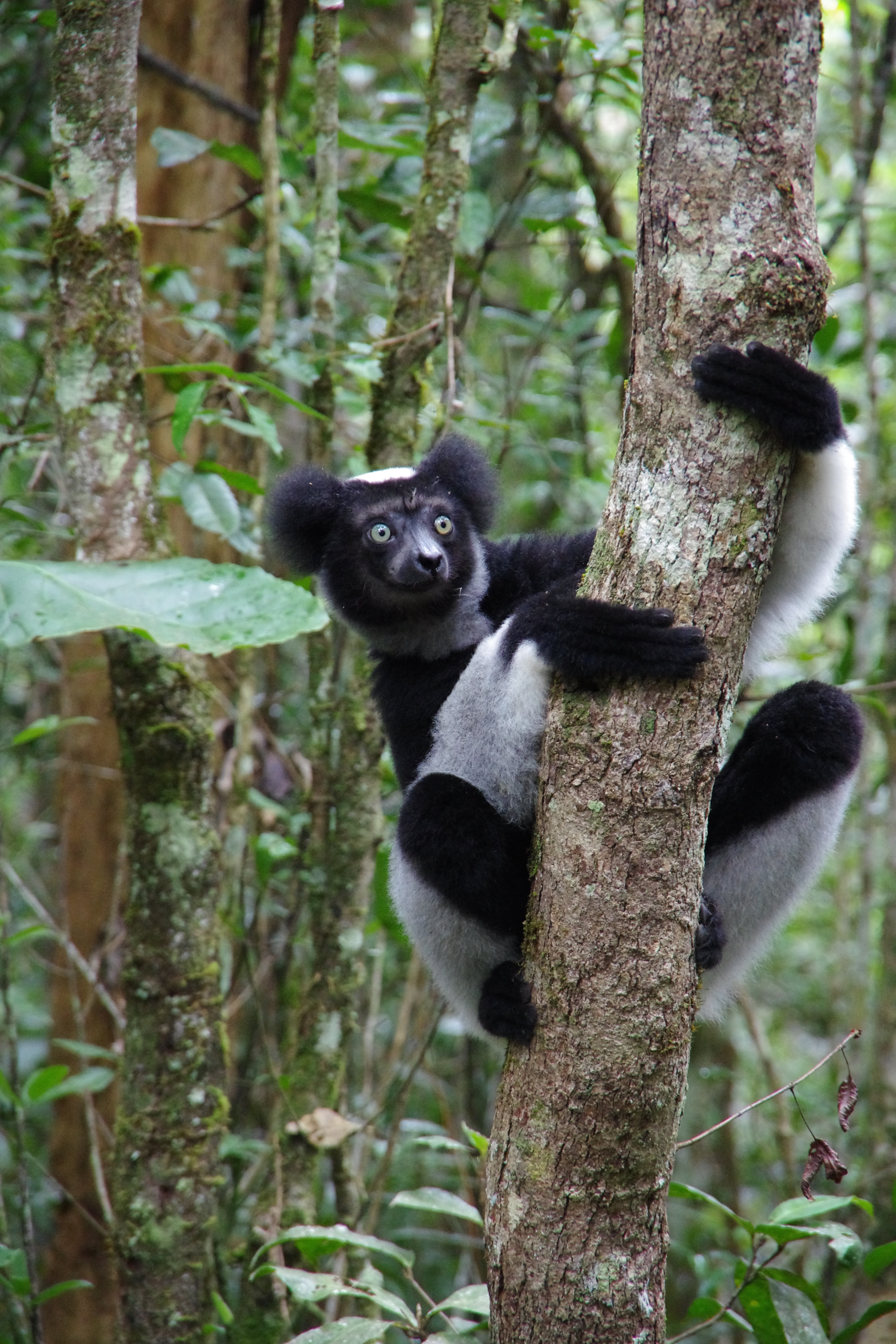
Indri Lemur, photo courtesy of M. Pedrono
WCS is the delegated manager of the Makira Natural Park which was formally created in 2012 after a ten-year period of consultation with local communities, and socio-economic and ecological studies. WCS collaboratively manages the Park with local communities and has a strong commitment to contributing to the improved wellbeing of local populations. WCS has supported 67 community associations to establish a ‘green belt’ around the core forest of Makira and works with these communities to diversify livelihoods options through improving production skills and access to markets for high-quality natural resource based products. In return communities are active partners in Park management activities through involvement in patrols and ecological monitoring activities.
“We are very proud to have obtained this certification for the products produced by communities living around Makira. The work that we do with local communities to improve production quality and thus help to ensure sustainable households revenue has the ultimate goal of contributing to the conservation of the unique biodiversity found in this area, and the Wildlife Friendly® certification is a recognition of this link. We have had very positive feedback from international clients on the quality of products from Makira, and we are delighted to be part of the Wildlife Friendly network as it will help us increase the visibility of these products in new markets” said Alison Clausen, Country Director of the WCS Madagascar program.
###
About Wildlife Friendly Enterprise Network
WFEN and its Certified Wildlife Friendly® and Predator Friendly® certification programs represent grassroots farmers, ranchers, artisans and conservation heroes from around the world including two World Bank Development Marketplace Award winners, a U.N. Equator Prize winner, leadership in the world’s marketplace for REDD+ Carbon Offsets, a Time Hero for the Planet, and a National Geographic Big Cats Initiative grantee. Certified Wildlife Friendly® products contribute to the conservation of over twelve million hectares of diverse wetlands, forests, and grasslands; protect keystone endangered species in Asia, Africa, Europe, and Latin and North America, including the Snow Leopard, Elephant, Cheetah, Spectacled Bear, and Wolf; and benefit over 200,000 people through increased food security, income and employment. For more information visit: www.wildlifefriendly.org
About the Wildlife Conservation Society (WCS)
MISSION: WCS saves wildlife and wild places worldwide through science, conservation action, education, and inspiring people to value nature. VISION: WCS envisions a world where wildlife thrives in healthy lands and seas, valued by societies that embrace and benefit from the diversity and integrity of life on earth. To achieve our mission, WCS, based at the Bronx Zoo, harnesses the power of its Global Conservation Program in more than 60 nations and in all the world’s oceans and its five wildlife parks in New York City, visited by 4 million people annually. WCS combines its expertise in the field, zoos, and aquarium to achieve its conservation mission. Visit: www.wcs.org;https://www.facebook.com/TheWCS; https://www.youtube.com/user/WCSMedia Follow: @thewcs.
Contact:
Wildlife Friendly
Julie Stein: Julie@wildlifefriendly.org

Wildlife Friendly Enterprise Network Teams Up in Unique Partnership with Ethical Fashion Forum and its SOURCE Netork
Ethical Fashion Forum and Wildlife Friendly® Join Efforts to Showcase Sustainable Fashion Combining Substance and Style for the Benefit of People and the Planet
FOR IMMEDIATE RELEASE
London – Feb. 17, 2014 – The Wildlife Friendly Enterprise Network (WFEN), an organization dedicated to the development, certification and marketing of products that conserve threatened wildlife while contributing to the economic vitality of local communities, is pleased to announce that it has joined forces with the Ethical Fashion Forum’s SOURCE Network in a unique new partnership. SOURCE Network, the global platform for sustainable fashion which provides tools and services for the fashion and textiles industries, and WFEN, with a network comprised of the worlds experts on wildlife conservation and sustainable development, will work together to promote conservation of some of the world’s most endangered species, living next to some of the most economically disadvantaged communities, in some of the most spectacular landscapes left on earth through sustainable fashion, working from field to final product to promote responsible production practices, enterprise development, education, branding and retail.
As part of this partnership WFEN also welcomes Ethical Fashion Forum as its 3rd Founding Corporate Member. Julie Stein, co-founder and Executive Director of WFEN said “We are fielding increased interest from the sustainable fashion world in ‘greening’ their supply chains through Wildlife Friendly® sourcing. This is a fantastic opportunity for both organizations to raise awareness and increase impact. We believe this two-way partnership will build on that growing momentum truly combining style with substance for global consumers.”
One channel through which WFEN expects to reach these consumers is via a regular expert guest column for SOURCE Intelligence, the largest B2B resource for sustainable fashion. The Wildlife Friendly® certified ‘cashmere with a conscience’ project lead by the Wildlife Conservation Society was featured by Ethical Fashion Forum’s SOURCE Intelligence in an article exploring fashions ‘wild’ side and sourcing with conservation in mind.
In addition, WFEN and its certified enterprises are already benefitting by effectively expanding the reach of often rural and remote enterprises through online and in person events. The Wildlife Friendly® certified Women for Conservation project which works with women living in the buffer zone outside of two important bird reserves in Colombia, recently participated in a curated global showcase for sustainable fashion called Brand Preview enabling them to access a worldwide audience through Ethical Fashion Forum’s 7000 members in 130 countries. This sustainably produced jewelry line not only empowers women artisans to become financially independent but makes them conservation pioneers and catalysts for change in their own communities through linked initiatives to protect two critically endangered birds, El Paujil de Pico Azul (Crax alberti) and the Santa Marta Parakeet (Pyrrhura viridicata), both endemic to Colombia. Read more »


